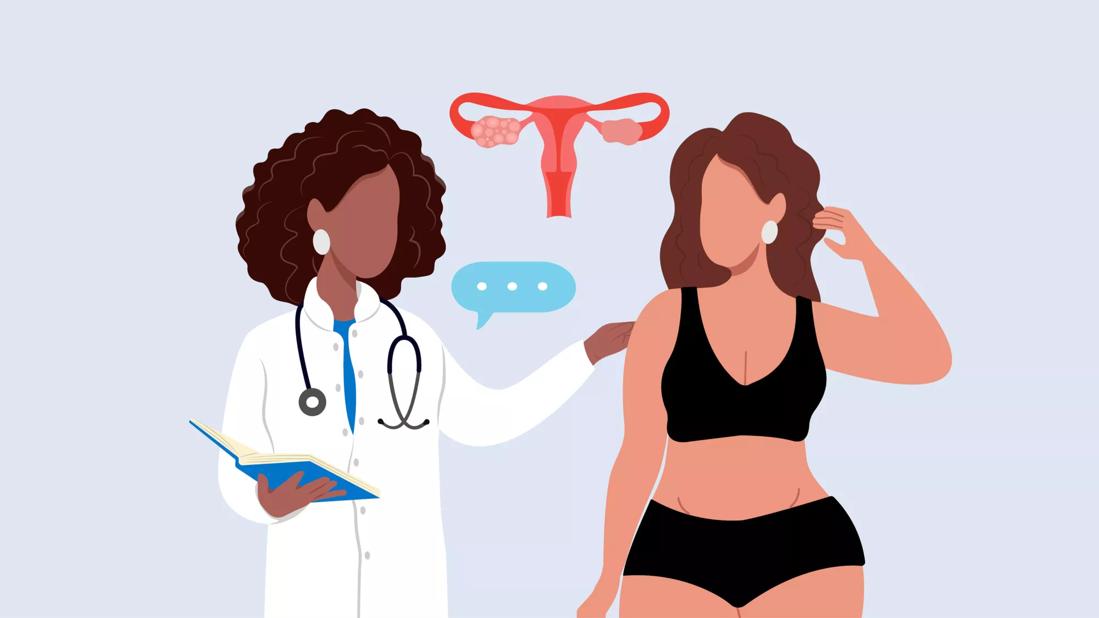The common hormonal condition is linked to insulin resistance, which can cause weight gain

Image content: This image is available to view online.
View image online (https://assets.clevelandclinic.org/transform/b86c2f38-b8a6-483b-96c4-48650e66d3b0/PCOS-Weight-Gain-1622941481-967x544-1-scaled_jpg)
Female speaking with doctor, with uterus and ovary with cysts
Most conversations with your doctor about polycystic ovary syndrome (PCOS) probably tend to focus on irregular menstrual periods, including missed and/or heavy periods. But people with PCOS face other issues, too — and a big one is weight gain.
Advertisement
Cleveland Clinic is a non-profit academic medical center. Advertising on our site helps support our mission. We do not endorse non-Cleveland Clinic products or services. Policy
It’s not clear whether PCOS is a direct cause of the extra pounds many people with PCOS carry, but according to Ob/Gyn Yolanda Thigpen, MD, a link does exist.
“Experts think a combination of genetic predisposition and environmental factors, including diet, exercise and lifestyle, contribute to the PCOS symptoms,” she says.
PCOS affects up to 15% of women and people assigned female at birth (AFAB), with symptoms appearing as early as age 11.
Knowing how it can impact your weight can help motivate you to take control of it and other health issues, including diabetes, she says.
Dr. Thigpen explains what PCOS weight gain looks like and how you can minimize the impact of PCOS on your life.
PCOS occurs when your hormones are out of balance. Women and people AFAB with PCOS make slightly more male hormone called androgen than normal. Even a tiny increase in androgen production can have an impact on how your ovaries function.
Healthcare providers look for two out of three symptoms when making a diagnosis:
Advertisement
PCOS can also cause:
But the symptom that’s most likely connected to weight gain is insulin resistance, Dr. Thigpen states.
Many people who have PCOS also have insulin resistance, which happens when your body has difficulty pulling glucose from your bloodstream and converting it to energy. So, your body needs to produce more insulin in an attempt to maintain a normal blood sugar level. Over time, your body begins to overproduce insulin to keep your blood sugar level normal.
Insulin resistance is often cited as a large contributing factor to obesity, Dr. Thigpen says. When blood glucose levels continue to rise despite increased insulin levels, Type 2 diabetes develops.
“PCOS itself might make a person gain weight more easily than others,” she adds. “And the more weight they gain, the more additional symptoms they’ll have.”
In fact, she says that more than half of people with PCOS have overweight.
While most women or people AFAB tend to carry weight in their hips, thighs and buttocks — which is known as a pear-shaped body — people with PCOS tend to carry their weight in their abdomen. This resembles an apple shape.
“A PCOS belly is characterized by excess weight gain around the midsection, which can be difficult to lose,” clarifies Dr. Thigpen. “This type of weight gain is often referred to as central obesity.”
You may have heard of the term “PCOS belly.” This is the area where fat resides in your lower abdomen. It can appear as if you’re bloated.
“The waist-to-hip ratio is greater due to fat accumulation and is often described as having a ‘spare tire’ or ‘muffin top’ appearance,” explains Dr. Thigpen.
Unfortunately, there’s no cure for PCOS. But there are things you and your doctor may do to minimize its impact:
Advertisement
Whether PCOS is a direct cause of weight gain or not, it’s clear that losing weight is helpful, Dr. Thigpen says. “When it comes to PCOS, a main focus is always on weight loss, diet modification and lifestyle changes.”
Advertisement

Sign up for our Health Essentials emails for expert guidance on nutrition, fitness, sleep, skin care and more.
Learn more about our editorial process.
Advertisement
Losing menopause weight may take more effort, but it’s doable
Depending on their size, these noncancerous growths can create an abdominal bulge
Diet sodas are associated with weight gain, and may even cause insulin confusion
Stress hormones trigger cravings in an attempt to keep us safe from danger
Sometimes, gaining weight is a health necessity
Find out if liquid calories are crashing your party and your diet
Advice for smart holiday eating, while still enjoying yourself
How overtreatment for hypothyroidism places you at risk
Type 2 diabetes isn’t inevitable with these dietary changes
Applying a hot or cold compress can help with pain
Pump up your iron intake with foods like tuna, tofu and turkey